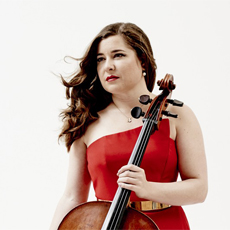by Mike Telin

The concerts are not only a homecoming for Weilerstein, they are also the rekindling of a partnership with Gilbert that dates back to 1995. “I was thirteen and he was the assistant conductor of The Cleveland Orchestra. I played Tchaikovsky’s Rococo Variations and it was my debut with a professional orchestra,” the cellist said.
Although the Tchaikovsky is a staple of the cello concerto repertoire, Weilerstein noted that Barber is underrepresented on the concert stage.
What prompted her to take up a work that other cellists have neglected? “I was 21, and Marin Alsop asked me to learn it. I first played it in the U.K. because at the time Marin was the director of the Bournemouth Symphony Orchestra. We also took it on tour to Leeds and Manchester, and I played it in the big hall in Birmingham.”
After those initial performances Weilerstein said that she didn’t play the concerto again for a few years because no one asked her. “I can advocate for a piece, but the artistic staff and conductor have to want it as well. People either didn’t know the concerto or were skeptical because it wasn’t played all that often. But I have been performing it more recently, so I do think people are coming around to the realization that it is a masterpiece.”
Weilerstein describes the concerto as an emotional piece that is full of fireworks and aching lyricism and that stretches the technical limits of the cello. “Harmonically speaking, this is one of his more adventurous pieces. Everyone is familiar with the Violin Concerto — it’s quite romantic, very tonal, and beautiful. The Cello Concerto is a little bit grittier. It’s from 1945, so it is at the end of the Second World War, and Barber had served in the Army, so I think some of that seeped into it. There are some jazzy rhythms especially in the last movement, which is the most virtuosic and flashy. It also has some of the most interesting writing, rhythmically and harmonically speaking. I think it’s a really fun movement to listen to. There are a lot of ideas that are kind of thrown at you. If you blink you might miss them, but it creates a dramatic effect.” Click here to hear more of Weilerstein’s thoughts on the work.
In addition to performing concertos with symphony orchestras, Weilerstein was recently named Artistic Partner of Norway’s Trondheim Soloists. “We’re about to make our first recording in April. I’ll play/direct in both Haydn concerti, as well as the chamber orchestra version of Verklärte Nacht.”
Although she has spent a bit of time in Norway, it has mostly been in Oslo. “I’ve played with the Philharmonic a couple of times, and I’m also one of the mentors at the Crescendo Festival, so last summer I spent two weeks in Bergen, playing and coaching younger musicians. I’ve only spent a little time in Trondheim, but it’s really striking. It’s not far from the Arctic circle and the landscape is just gorgeous — all the topography in Norway is beautiful.”
Weilerstein also has an informative Facebook presence, where fans can keep up with her work as the Celebrity Advocate for the Juvenile Diabetes Research Foundation — and her favorite popular artists like Björk. “She’s a force of nature, and so original and passionate. She has created her own sound world that has this wonderful combination of escapism with a raw, earthy energy at the same time, and I love that.”
Published on ClevelandClassical.com March 13, 2018.
Click here for a printable copy of this article


